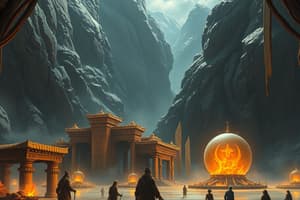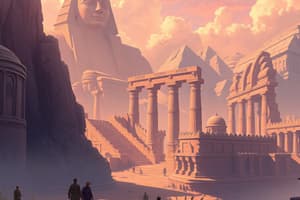Podcast
Questions and Answers
What characterized the Prehistoric Era?
What characterized the Prehistoric Era?
- Stone tools and hunter-gatherer societies (correct)
- Colonization and global trade networks
- Rise of democracy and trade
- Development of writing
What event is commonly associated with the shift to the Middle Ages?
What event is commonly associated with the shift to the Middle Ages?
- The Industrial Revolution
- The Agricultural Revolution
- The Fall of the Roman Empire (correct)
- The rise of Christianity
Which historical period is noted for the revival of art and culture between the 14th and 17th centuries?
Which historical period is noted for the revival of art and culture between the 14th and 17th centuries?
- Modern History
- Early Modern Period
- Renaissance (correct)
- Classical Antiquity
What does historiography study?
What does historiography study?
Who is known as the 'Father of History'?
Who is known as the 'Father of History'?
What major global conflict occurred between 1914 and 1918?
What major global conflict occurred between 1914 and 1918?
What does the theme of 'Power and Authority' examine in history?
What does the theme of 'Power and Authority' examine in history?
Which tool is primarily used to visualize the sequence of historical events?
Which tool is primarily used to visualize the sequence of historical events?
Flashcards are hidden until you start studying
Study Notes
Overview of History
- Definition: Study of past events, societies, and cultures.
- Purpose: Understand how past influences present and future.
Key Periods in History
-
Prehistoric Era:
- Before written records.
- Characterized by stone tools, hunter-gatherer societies.
-
Ancient History:
- Development of writing (c. 3000 BCE).
- Major civilizations: Mesopotamia, Egypt, Indus Valley, China, Mesoamerica.
-
Classical Antiquity:
- Rise of empires (e.g., Greece, Rome).
- Development of philosophy, democracy, and trade.
-
Middle Ages:
- Fall of Rome (5th century CE).
- Feudalism, the rise of Christianity and Islam.
-
Renaissance:
- Revival of art, culture, and intellectual pursuit (14th-17th century).
- Humanism and scientific advances.
-
Early Modern Period:
- Age of Exploration (15th-17th century).
- Colonization and global trade networks.
-
Modern History:
- Industrial Revolution (18th-19th century).
- World Wars and the Cold War (20th century).
- Post-Cold War and globalization.
Important Concepts
-
Historiography: Study of how history is written and the interpretation of historical events.
-
Primary vs. Secondary Sources:
- Primary: Original documents like letters, artifacts.
- Secondary: Analyses and interpretations of primary sources.
-
Causation and Change: Understanding why events occurred and their impacts on society.
Notable Historians
- Herodotus: Often called the "Father of History."
- Thucydides: Known for his critical historical methodology.
- Marc Bloch: Co-founder of the Annales School, emphasizing social history.
Major Historical Events
- The Agricultural Revolution (c. 10,000 BCE): Transition to farming.
- The Fall of the Roman Empire (476 CE): Shift to Middle Ages.
- The French Revolution (1789): Rise of democracy and nationalism.
- World War I (1914-1918): Major global conflict reshaping borders and societies.
- World War II (1939-1945): Extensive political, cultural, and social change.
Themes in History
- Power and Authority: Examining the rise and fall of governments and leaders.
- Cultural Exchange: Impact of trade, migration, and conquest on societies.
- Social Structures: Class systems, gender roles, and demographic changes over time.
Tools for Studying History
- Chronologies: Timelines to visualize historical events.
- Maps: Geographic context of historical events.
- Critical Analysis: Evaluating sources and understanding bias.
Conclusion
History is a dynamic field that helps us comprehend human experiences and societal development, requiring critical thinking and analytical skills to interpret past events effectively.
Overview of History
- Study of past events, societies, and cultures to understand their influence on the present and future.
Key Periods in History
- Prehistoric Era: Characterized by the use of stone tools and hunter-gatherer societies before written records.
- Ancient History: Emergence of writing around 3000 BCE; major civilizations included Mesopotamia, Egypt, Indus Valley, China, and Mesoamerica.
- Classical Antiquity: Notable for the rise of empires such as Greece and Rome, and significant developments in philosophy, democracy, and trade.
- Middle Ages: Marked by the fall of Rome in the 5th century CE; emergence of feudalism and the rise of Christianity and Islam.
- Renaissance: A cultural revival from the 14th to 17th centuries focusing on art, culture, and intellectual pursuits, alongside humanism and scientific advancements.
- Early Modern Period: Characterized by the Age of Exploration between the 15th and 17th centuries, initiating colonization and the establishment of global trade networks.
- Modern History: Featured the Industrial Revolution in the 18th and 19th centuries, followed by global conflicts including World Wars and the Cold War, leading into post-Cold War globalization.
Important Concepts
- Historiography: Exploring how history is written and interpreted.
- Primary Sources: Original artifacts and documents, such as letters.
- Secondary Sources: Analyses and interpretations derived from primary sources.
- Causation and Change: Investigating the reasons behind events and their effects on society.
Notable Historians
- Herodotus: Regarded as the "Father of History" for his work in historical narrative.
- Thucydides: Celebrated for his critical and analytical methodologies in historical writing.
- Marc Bloch: A founding figure of the Annales School, which emphasizes the study of social history.
Major Historical Events
- Agricultural Revolution (circa 10,000 BCE): A pivotal shift from foraging to farming, influencing societal structures.
- Fall of the Roman Empire (476 CE): Led to the transition into the Middle Ages.
- French Revolution (1789): A significant event that promoted democracy and nationalism.
- World War I (1914-1918): A global conflict that altered national borders and societal structures.
- World War II (1939-1945): Brought extensive political, cultural, and social changes worldwide.
Themes in History
- Power and Authority: Investigation of how governments and leaders rise and fall over time.
- Cultural Exchange: Effects of trade, migration, and conquest on the evolution of societies.
- Social Structures: Analysis of class systems, gender roles, and demographic changes through history.
Tools for Studying History
- Chronologies: Timelines used to visualize and understand the sequence of historical events.
- Maps: Provide geographic context, illustrating the locations of significant events and changes.
- Critical Analysis: Emphasizes the importance of evaluating historical sources while recognizing biases.
Conclusion
History serves as a dynamic study of human experiences and societal evolution, demanding critical thinking and analytical skills to effectively interpret historical events.
Studying That Suits You
Use AI to generate personalized quizzes and flashcards to suit your learning preferences.




